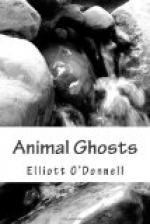“The Dean hardly seemed to realize the situation. The dignity of office blinded him to danger.
“‘What do you mean?’ he spluttered. ’I know nothing of what happened to Mr. Anderson! Really, really, O’Farroll, your presumption is preposterous.’
“‘There was no one else in here but you and he, Mr. Kelly,’ O’Farroll retorted coolly. ’It’s only natural we should think you know something of what happened!’
“On the arrival of the police who had been sent for somewhat reluctantly—for the prestige of the College at that date was very dear to all—the premises were thoroughly searched, and, no other culprit being found, first of all Dean Kelly was apprehended, and then, to make a good job of it, his accuser, Denis O’Farroll.
“All the College was agog with excitement. No one could believe the Dean was a murderer; and it was just as inconceivable to think O’Farroll had committed the deed. And yet if neither of them had killed Anderson, who in God’s name had killed him?
“The night succeeding the affair, whilst the Dean and O’Farroll were still in jail awaiting the inquest, a party of undergraduates were discussing the situation in Maguire’s rooms, when the door burst open, and into their midst, almost breathless with excitement, came a measly, bespectacled youth named Brady—Patrick Brady.
“‘I’m awfully sorry to disturb you fellows,’ he stammered, ’but there have been odd noises just outside my room all the evening, and I’ve just seen a queer kind of dog, that vanished, God knows how. I—I—well, you will call me an ass, of course, but I’m afraid to stay there alone, and that’s the long and short of it.’
“‘Begorra!’ Maguire exclaimed, ’it can’t be poor Bob’s ghost already! What sort of noises were they?’
“‘Noises like laughter!’ Brady said. ‘Loud peals of horrid laughter.’
“‘Someone trying to frighten you,’ one of the undergrads observed, ’and faith, he succeeded. You are twice as white as any sheet.’
“‘It’s ill-timed mirth, anyhow,’ someone else put in, ’with Anderson’s dead body upstairs. I’m for making an example of the blackguard.’
“‘And I,’—’And I,’ the others echoed.
“A general movement followed, and headed by Brady the procession moved to the north wing of the College. At that time, be it remembered, a large proportion of K. undergrads were in residence—now it is otherwise. On reaching Brady’s rooms the crowd halted outside and listened. For some time there was silence; and then a laugh—low, monotonous, unmirthful, metallic—coming as it were from some adjacent chamber, and so unnatural, so abhorring, that it held everyone spell-bound. It died away in the reverberations of the stone corridor, its echoes seeming to awake a chorus of other laughs hardly less dreadful. Again there was silence, no one daring to express his thoughts. Then, as if by common consent, all turned precipitately into Brady’s room and slammed the door.




